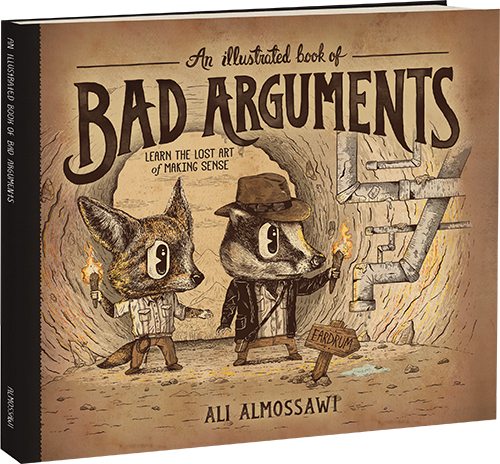ABOUT BOOKS
By Joan Bauer
AN ILLUSTRATED BOOK OF BAD ARGUMENTS
(LEARN THE LOST ART OF MAKIG SENSE)
by Ali Almossawi
The Experiment, LLC, New York
Where and how did you learn to think? Is the way you think now the way you will always think? Are you a good arguer? Are you too old to change? Too young to care? Too emotional? Have you decided in this winner takes all world, that it’s better to keep your thoughts to yourself and avoid the conflict of conversations that could likely turn into arguments, misunderstandings, or free-for-alls? Oh, Dear Reader, have I got a book for you.
Ali Almossawi has written a multi-layered, marvelous book about logical reasoning that is desperately needed. The cover and size (fifty-one pages) might make you think it’s for kids, and while the art is engaging, this is not a picture book for little ones. It’s a picture book for us—a bold, fascinating look at fallacy—a word that seems to have fallen out of play, but still, collides with our senses throughout the days. It is evident in our politics and our online debates. The fallacy is having a darned good run. The misconception that the world is flat (not Thomas Friedman’s best-seller on globalization), made the rounds in the 14th century while scientists and explorers tried to debunk it. There are plenty of misbeliefs today to keep us occupied. Almossawi presents nineteen logical fallacies—from the informal to red herrings. Among them:
• The Ad Hominem approach (from the Latin meaning “to the man”): “attacks a person rather than the argument he or she is making”…such as, “You’re not a historian. Why don’t you stick to your own field?”
• The Hasty Generalization: “asking ten people on the street what they think of the president’s plan to reduce the deficit can in no way be said to gauge the sentiment of the entire nation.”
• The Slippery Slope argument: “attempts to discredit a proposition by arguing that its acceptance will undoubtedly lead to a sequence of (terrible, horrible, unknown) events…”
The beauty of Almossawi’s book is it’s seeming simplicity entwined with clear-eyed reasoning. It is an appeal to think and listen and try, in this increasingly biased world, to be impartial. I’m betting you might groan a few times like I did at the way we buy into fallacies without thinking. How many times have I been caught by feeling that one event caused another event:
At the end of every night and shortly before dawn, the beaver walks all the way to the top of the mountain and asks the sun to come out.
The sun always does. Well, of course, it does. The beaver’s walk happens just before dawn but doesn’t cause the sunrise. But the beaver is there every morning, isn’t it? Might he have something to do with the dawn? Might he and the sun have an understanding? I’m particularly fond of this beaver story—it’s a good one to use with children who love “what if?” games. I can picture some terrific family dinner moments surrounding this book, showing children how to think clearly and not just emotionally. And The Appeal to Hypocrisy can come to a wearied parent’s aid when trying to diffuse sibling argument:

- Guy bear says to girl bear: Why do you keep eating my porridge?
- Girl bear’s retort: How about I start listing all your bad habits?
Yes, we have all been there, and these conversations never end well. To see the pitfalls in arguments when they are presented—instead of tripping over them—could significantly improve life. To listen, actually listen—how rare is that gift of time becoming? To listen without waiting for a pause to jump in. To listen with intelligence and with openness, trying to gain some understanding of where the other person is coming from and evaluating arguments on their merits. It is this last point that is the hardest, of course. But if communication is like a highway and we are like cars approaching an intersection, we’d best obey the rules to stop, look, and then proceed.
I suppose our emotions will always build walls to truth. Who doesn’t want to be right, win an argument, or have the last word? It is markedly tough to be impartial in a world with lines drawn that are often not of our own making. But An Illustrated Book of Bad Arguments wants us to see the traps and fight our way through to sense and reason. In doing so, like engaging in brain strengthening games and cognitive exercises, maybe, just maybe, our synapses will spark, our neurons will multiply, and from arguments we can build a better world.

Joan Bauer is a New York Times bestselling novelist and winner of the Newbery Honor Award, the LA Times Book Prize, and two Christopher Awards. Her latest novel is Soar, published by Viking/Penguin Random House. Connect with her on Twitter @joan_bauer or at joanbauer.com.





